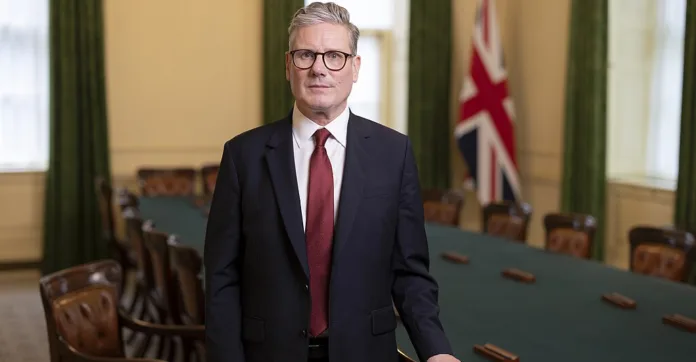Sir Keir Starmer remains resolute in suspending seven Labour MPs who defied the party’s position on the two-child benefit cap
Sir Keir Starmer has firmly defended his decision to suspend seven Labour MPs following their rebellion against the two-child benefit cap. The suspended MPs, including high-profile figures such as John McDonnell and Rebecca Long-Bailey, voted against the government’s stance on the cap, which limits child tax credits and universal credit to the first two children in a household.
Starmer’s spokesperson justified the suspensions, emphasizing that the MPs’ defiance of the party’s position on the King’s Speech represented a serious breach of party discipline. The spokesperson reiterated that Labour’s stance on the two-child benefit cap was clear from the outset, driven by the need to adhere to economic constraints and avoid unfeasible promises.
Embed from Getty ImagesThe internal strife within Labour has sparked considerable controversy. Zarah Sultana, one of the suspended MPs, denounced the suspensions as a “macho virility test” and accused Starmer of wielding power excessively. Apsana Begum, another suspended MP, voiced her concerns about the adequacy of support for domestic abuse survivors, arguing that the policy’s impacts on vulnerable groups were being overlooked.
The conflict within Labour highlights a deeper divide over policy and leadership. The party’s approach to the benefit cap, and the subsequent suspensions, reflect ongoing tensions about the balance between maintaining party unity and addressing individual MPs’ principles. As the party grapples with internal dissent, it faces increased scrutiny from both the public and political opponents.
In parallel, the Conservative Party is preparing for a leadership race as Prime Minister Rishi Sunak plans to step down in November. Prominent Tory figures, including James Cleverly and Priti Patel, have submitted their nominations, with the official deadline approaching. The leadership contest promises to be a significant event in British politics, potentially influencing future policy directions.
Labour’s legislative agenda also moves forward with the introduction of the GB Energy Bill. Starmer’s government is set to establish a publicly-owned energy generation company headquartered in Scotland. The new company, GB Energy, aims to drive the UK’s clean energy goals and attract substantial investment, particularly in Scottish industries like offshore wind and hydrogen. The proposed legislation reflects Labour’s commitment to enhancing the UK’s green energy infrastructure.
Amid these developments, research from the Food Foundation has highlighted the impact of the two-child benefit cap on food insecurity. Nearly a quarter of families with three children reported experiencing food insecurity, underscoring the policy’s effects on struggling households. Education Secretary Bridget Phillipson also announced a pause on planned funding cuts to BTec courses, responding to concerns about gaps in the qualifications landscape.
Analysis:
Political: The suspensions of seven MPs from the Labour Party underscore a significant political rift. The decision by Starmer to penalize MPs who rebelled against party policy illustrates the challenges of maintaining party discipline while addressing contentious issues. This internal conflict could impact Labour’s cohesion and effectiveness, particularly as the party navigates the complexities of policy implementation and leadership decisions. The Tory leadership race adds another layer of political intrigue, with potential shifts in Conservative policies depending on the outcome.
Social: The debate over the two-child benefit cap and the resulting suspensions reflect broader societal concerns about welfare and support for vulnerable groups. The policy’s impact on food insecurity and domestic abuse services highlights the real-world effects of government decisions on families. The internal conflict within Labour also mirrors societal debates about accountability, leadership, and the balance between party unity and individual principles.
Racial: While the immediate news focuses on political and policy issues, the implications of the two-child benefit cap and the suspension of MPs may have racial dimensions. The impacts of welfare policies often disproportionately affect minority communities, raising questions about how these policies address or fail to address the needs of diverse populations. The diversity among the suspended MPs also brings attention to how party decisions and policies intersect with racial and ethnic considerations.
Gender: The controversy surrounding the benefit cap and the suspensions includes gendered aspects, particularly in terms of how policies impact women and families. The criticism from suspended MPs, especially those focusing on domestic abuse, highlights concerns about how gendered issues are handled within policy frameworks. The debate also touches on broader issues of gender equity, particularly in the context of support services and economic hardship.
Economic: The economic implications of the two-child benefit cap are significant, as evidenced by the Food Foundation’s research on food insecurity. The policy affects families’ ability to afford basic necessities, illustrating the broader economic challenges faced by low-income households. Labour’s focus on establishing GB Energy and pausing cuts to BTec courses reflects a strategic economic approach aimed at boosting investment and addressing qualifications gaps. These moves highlight the government’s efforts to balance immediate welfare concerns with long-term economic goals.
